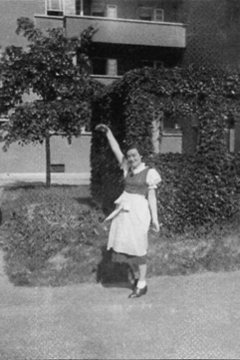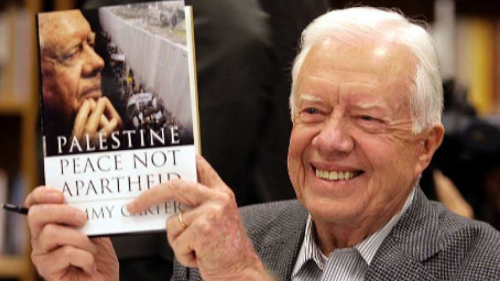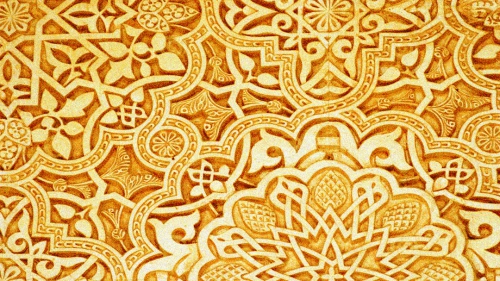Muslim and Arab Response to the Holocaust and World War II
 |
| The Kocerri family from Albania: Muslims who saved Jews in World War II. (Norman H. Gershman photo) |
Who are they?
Muslims: Ones who submit to God, the God of Abraham, Moses, Jesus and Muhammad
Islam: The religion of peace through submission to God
The Ummah: All Muslims see themselves as belonging to the Ummah of Muhammad, which is a universal family
Diversity: The Ummah consists of Schools of Thought. The Sunni Tradition consists of Shafi, Hanafi, Hanbali, Maliki schools. Shia Islam , about 10% of the ummah, is usually described the Jaafari School, but there are many variations within that broad category. Within all Schools of Thought there is diversity, based on regional culture and past traditions.
Beliefs: To be Muslim, one must believe and publically state that he or she believes in One God and that Muhammad is His Final Messenger. This entails acceptance of the authority of the Quran and the five pillars of Islam: statement of belief, 5 times daily prayer, paying zakat, fasting in Ramadan, and the pilgrimage to Makkah for those with the means.
Arabs and Islam: Arabs make up about 15% of the ummah. It ought to be a truism that "the Arabs" do not exist-at least not as a homogeneous political or ideological subject. Yet such use of a general category known as "the Arabs" is common in both journalism and the specialist literature. "The Arabs" are supposed to think and act or react in unison. Of course, like "the Jews" or "the Muslims", "the Arabs" as a politically and intellectually uniform group exist only in fantasy, engendered by the distorting prism of either ordinary racism or polemical fanaticism.1 The ideological and political crosscurrents in the Muslim and Arab worlds make any reduction of them to a stereotypical mindset is a distortion of reality.
Attitudes to the British Empire, World War II Nazism
There was a huge diversity in attitudes to, World War II, the British Empire and Nazism amongst Muslims and Arabs in the 1930s and 1940s.
The shaping of public opinion in these areas must be understood against a background of catastrophe post-World War I. It resulted in the destruction of the Caliphate and of Islamic rule in some places where it had existed for nearly 1400 years.
The British and the French were regarded with considerable hostility by all those who sought independence from imperial rule, whether French or British, due to this experience. There were of course many who found opportunities in the situation.
Hostility towards the WWI Allies can be traced to a few major issues:
The Sykes-Picot Treaty, when it was published by the victorious Russian Bolsheviks after 1917, exposed the betrayal of all that had been offered by the Allies for the Arab Revolt against the Ottomans. Instead of an Arab State free from imperial rule, Jordan, Syria and Iraq were allocated to French and British collaborators. Monarchies protected by the Europeans under a charade of self-government were the result.
Sharif Hussein, who had orchestrated the Arab revolt, was sidelined, and removed from power, to prevent even a shadow Caliphate under British rule from coming into existence. The Hejaz, the site of the Sacred Territories, was given to the Saudi-Wahhabi alliance, which remains in power today.
The British Balfour Declaration of 1917 promised imperial support for a Jewish homeland in Palestine, which was seen as a threat to the Holy City and to the Arab population, both Christian and Muslim, of the region. While a homeland for the Jews in Palestine was widely acceptable, a Jewish Homeland on Palestinian territory was not.
Achcar in The Arabs and the Holocaust describes four currents in the Arab anticolonial independence movement, none of which, he points out, enjoyed dominance. All of them had their particular take on Nazism and the outbreak and waging of WWII.
1. Liberal Westernizers
2. Marxists
3. Nationalists
4. Reactionary/fundamentalist Pan Islamists
Liberal Westernizers
Westernizers, according to Achcar, were not unconditional admirers of the west but were rather advocates for the adoption of the Enlightenment values that dominated Western Europe, along with the necessary industrial civilization which functioned with those values.
They were liberal in the sense that they favoured the remolding of society on the basis of an essentially secular conception of the state and rational-humanitarian values.
While opposing fascism and Nazism from the outset, they also opposed, on anti-colonial grounds, the premises of Zionism.
The popularity of this stream of thought suffered badly from the wide awareness of the Arab masses, and indeed Muslims all over the world, of the contradiction between Enlightenment values and European colonialism and its accompanying ideology of racial supremacy.
Israel Gershoni, a specialist in Egyptian intellectual history at the University of Tel Aviv , established that "the overwhelming majority of Egyptian voices - in the political arena, in intellectual circles, among the professional, educated urban middle classes and even in the literate popular culture - rejected fascism and Nazism both as an ideology and a practice, and as 'an enemy of the enemy'."2
Al Risala (The Message - alluding to the message of Islam) was the most respected forum for Egyptian-Arab and other Arab intellectuals of the period of the 1930s
It regularly devoted space to a methodical, highly critical review of internal developments in Nazi Germany and in fascist Italy... Consistent support of liberal democracy and liberal values, attended by the rejection of fascist and Nazi totalitarianism, can also be found for example in the monthly Al-Hilal, in the daily Al-Ahram and in the illustrated weekly Ruz al-Yusuf....3
The daily Filastin (Palestine) the main Arabic daily for Palestine, even during the period of the Hajj Amin al-Husseini, the Mufti of Jerusalem, from 1933 portrayed Nazism as reactionary, dictatorial while voicing the conviction that democracy would eventually triumph.
During the war, it supported the British, although the colonial overlord, on the basis of universal rather than local values and demonstrated through traditional Arab-Islamic values that siding with the Nazis was precluded.
That the western powers after the Holocaust, did not open their borders to Jews from Europe, but rather preferred to encourage their migration to Palestine, still rankles in the Muslim and Arab worlds. Once again Enlightenment values were ignored by those who loudly proclaimed them to the world.
The Marxists
The Communist movement in the 1930s was in a period of ultra-leftism, in Germany fighting against both the fascists and social democracy, designated as "social fascism". This was also applied to Zionism. RundschauI the German language review of the Executive Committee of the Communist International said of the 1933 Zionist Congress in Prague; True, Hitler is the enemy of the Jews, but Hitler is a national German racist and the Zionists are national Jewish racists. At the bottom they speak the same language. And in fact it seems as though there might be some kind of understanding between Hitler and the Zionists.
It was in this context that Palestine's Communists underscored the 'remarkable similarity' between Nazism and Zionism and forged the label "Zionist-fascist" on the model of social-fascist". 4
This was less shocking in 1933 than post-Holocaust. Indeed Achcar points out that a 1934 book by Joachim Prinz, a German Zionist rabbi and future president of the World Jewish Congress, made clear his admiration for Nazism and its goal of racial "purification". 5
Prior to the Molotov-Ribbentrop Pact, the Syrian and Lebanese Communists had founded a League for the struggle against fascism but for 2 years dropped activity until the Nazis invaded Poland.
Achcar mentions the case of Najati Sidqi a Palestinian Communist leader and 1931 delegate to the Congress of Red International Labor Unions. His anti-Nazi attitudes were strengthened by cross-German travel in 1936. Strongly rejecting the Soviet-German pact, in 1938 he published in Beirut a series of articles on the incompatibility of Nazism and Islam which were collected and published as a book. He was expelled from the Communist Party.
Once the Nazis attacked Poland the USSR, Fascism became the main enemy and Zionism was explicitly demoted. The Arab Secretary of the Palestinian Communist Party, Ridwan al-Hilu in a 1943 speech in Jaffa proclaimed: Anti-Jewish terror in the fascist countries is in reality criminal act perpetrated by fascism that undermines the Arab cause and helps Zionism.
The Marxists generally interpreted Zionism as an attempt to deviate Jewish workers from the class struggle against capitalism. Achcar points out that the biggest flaw in the pro-Soviet Communists immigration arguments lay in the absence of an international Communist campaign to open the gates of all countries in which Jews fleeing Nazism could have found refuge, and to which 'displaced persons' of the postwar period could go. The overwhelming majority of both groups wanted to immigrate to the United States, which, tragically, ...granted access to only a small minority.
Not even the American Communists mobilized behind the demand that Jews be granted refuge there. 6
Marxist organisations in the Arab world had many Jewish members and the main Egyptian Communist organization in 1947, post-Holocaust, founded a Jewish league for the Struggle against Zionism. Jewish members of the Iraqi Communist Party in May 1946 demanded that Stalin support the Palestinian cause in the UNO. The Palestinian Arab Communists pinned the blame for the UN move towards partition on the Arab national movement which had paved the way for partition with its 'negative' and 'racialist' policy towards Palestine's Jewish inhabitants. 7
The support of Moscow for Palestinian partition at the UN in 1947 and the provision of Czechoslovak arms for the creation of an Israeli state, put a brake on the expansion of Communist influence in the region and in the Muslim world generally. It never really recovered.
===========
Notes:
1. Achcar, Gilbert. The Arabs and the Holocaust. The Arab-Israeli war of Narratives. Metropolitan Books, Henry Holt and Coy. NY.2009 p. 33
2. Achcar p.37
3. Ibid p.39
4. Achcar p.51
5. Ibid p.52
6. Achcar p.59
7. Ibid p.61
 |
| 'Muslim Schindler' who risked life to save Iranian Jews in wartime Paris. Abdol-Hossein Sardari was a junior Iranian diplomat in 1940 |
The Nationalists
Fascist Italy was reviled more strongly than either France or Britain, mainly due to the violent, bloody occupation of Libya. Imperial japan, far away from the Middle East, was often cited favourably as an example of modernization without westernization.
At first Nazi Germany attracted support from nationalists seeking independence from British rule in Palestine, Iraq and Egypt. This sympathy diminished considerably in areas under French occupation, where the Vichy puppet government ruled.
One of the most influential Arab nationalists, usually seen as the founder of the Ba'ath Party, Michel Aflaq, (a Christian), has been widely vilified as pro-Nazi but had links to Communist publications and as Achcar points out: The reality of the matter is that no one has found the least trace of anti-Semitism in Aflaq's writings; had such evidence ever been found, the discovery would quite certainly have been broadcast far and wide. 8
The Syrian Social Nationalist Party which is still in existence and which has also been described as pro-Nazi, was founded by Anton Saadeh, a Greek Orthodox Lebanese in 1932. His ideology was based on Christian sectarian fanaticism which rejects Arabs (especially African Arabs), Islam and even the East in favour of the supposed superiority of 'the Syrians' with their Mediterranean civilisation. Today it is an appendage of the Syrian Ba'ath Party regime. 9
The Lebanese Phalange, founded in 1936 by Pierre Gemayel, was patterned more upon the Francoist model, a 'clerical fascist' structure associated with the protection of Lebanese Christians, in particular the Maronites. While not democratic, it has not been associated with anti-Semitism.
Young Egypt, founded in 1933 by Ahmad Hussein, obviously inspired by the rise of European fascism, zigzagged between collaboration and criticism of fascist Italy, but in 1938 after Hussein's second visit to the Third Reich, it became pro-Nazi. Such attitudes were, unfortunately, not uncommon at the time.
Nevertheless it must be said that this modern abandonment by the Germans of individual liberty and of the easy and pleasant things of life has something rather magnificent about it. The Germans may be pulling down the Churches, but they have erected the State, with Hitler as its head, in a sort of religion which produces spiritual exaltation that one cannot but admire and some small portion of which would do no harm among our somewhat irresponsible populations.
R.Menzies, London, to family (Belle), 6 August 1938, Robert Menzies Papers, MS4936/572
Bird, David S., Nazi Dreamtime. Australian Enthusiasts for Hitler's Germany. Australian Scholarly. 2012 p. 49
Many Egyptian nationalists hoped for a German victory over Britain in North Africa due to their nationalism, not their hatred of Jews. Achcar points out: The young Egyptian soldiers viewed the Second World War as nothing more than a repetition of the first, for which their ancestors had been conscripted by their colonial oppressors and used as cannon fodder in a fight in which they had no stake. Sadat was among these. 10
Futuwwa, the high school movement in Iraq, while a youth organization, not a party, was an official youth movement comprised of upper secondary classes in high schools. It received military training and participated in the September 1938 youth rally in Nuremberg. However it should be noted that it had been sent there by the very pro-British Iraqi Government (five days before British prime minister Neville Chamberlain paid his first visit to Hitler). 11
The Al-Muthanna Club, formed in Iraq in 1935, was ultranationalist, anticommunist, and Pan-Arab, and cultivated an anti-Jewish or anti-Semitic tone that was implicit rather than explicit. A 1942 police report attributes the club's pro-Nazi turn to the influence of Amin al-Husseini, the mufti of Jerusalem, who visited Baghdad in October 1939. However the club issued a pamphlet in the same year which denounced Nazi ideology and Nazi Germany as an expansionist power, but did not take issue with anti-Semitism. It called on all Arabs to resist Communist, Zionist, Nazi, fascist and other colonialist movements detrimental to (their) identity and progress. 12
The Al-Gaylani government of Iraq during the April-May anti-Jewish pogrom in Baghdad was overthrown by the British and Gaylani himself eventually joined Husseini in Berlin. His motivation according to Achcar, was anti-British rather than anti-Semitic feelings.
Reactionary and/or Pan-Islamists
Every enduring religion has necessarily gone through a series of mutations in order to adapt to the evolution of the societies in which it exists. Islam, too, has lent itself to interpretations and reinterpretations throughout its variegated history, shaped at times by modernizing reformers, at others by traditionalist conservatives, reactionaries, or fundamentalist counterreformers. Who predominates in any given period depends, first and foremost, on the general development of ideologies and political "moods" conditioned by social developments and historical conjuncture. 13
The liberal Muslim Westernism of 1930s Egypt was a direct continuation of the reformist enterprise launched by Jamal-ud-Din al-Afghani and Muhammad Abduh in the closing decades of the nineteenth century, and was noticeably associated with men grouped around Al-Risala.... 14
The Pan-Islamism he advocated promoted Islamic unity under the Ottoman sultan, seen as a bulwark of Islam against the cultural and territorial encroachments of the West. The great immediate issue for the Muslims after WWI was unity around the Caliphate, which was abolished by Kemal Ataturk in 1924.
One of the outcomes of this abolition was the development of a reactionary counterreformation which, according to Achcar; seems to have emerged as a mutation from the reformist movement itself rather than being, as in the Christian case, the product of a frontal assault on it. 15 Rasheed Rida, who engineered this mutation, established what became known as Salafism. This brought him to association with the adherents of Wahhabism, who came to dominate the Hejaz, under the House of Saud. In 1926 Rida hailed this as a truly Islamic Salafi state.
The Saudi state is of immense importance in both modern Islamic history and Arab history.
The creation, in 1926, in the heartland where Islam was founded and its two main holy places are located, of a state based on the most fundamentalist interpretation of the religion ever to have existed contributed decisively to advancing the Islamic counterreformation. :Islamic reformation now possesses an armed state that fights heresies" (al-bida). The Wahhabi monarchy provided reactionary Pan-Islamism with a permanent strategic base and put the resources of a state at its service-resources that were initially modest but subsequently, thanks to oil, immense. Needless to say, the new kingdom's close and enduring ties with the United States go a long way toward explaining the curtain of silence drawn, with American complicity, around the basic features of the Saudi state, the most obscurantist, antidemocratic, and misogynistic in the world. 16
In its first year of existence, in June and July of 1926, the Saudi state organized an international Islamic conference in Mecca.
This is what one modern Islamic commentator has to say about this conference and events surrounding it:
Page 15: On 7 March 1924 Shareef Husain pre-emptively claimed the caliphate for himself. His most important credential was that he exercised de facto local control over the Hejaz. He also boasted of being Hashemite i.e. belonging to the same clan - Banu Hashim, of the tribe of Quraish, to which the Prophet (s) himself belonged.
..................
In claiming the Caliphate for himself however, Shareef Husain committed the monstrous blunder of not first seeking the permission of the British to act as he did. It is the essence of the client-State status that freedom is effectively curtailed. Shareef Husain had violated the basic rule of conduct for client-States.
Pages 16-17: The claim to the caliphate by the Hashemite British client, Shareef Husain, was incompatible with British diplomatic objectives. It was always possible that the claim could have succeeded. Shareef al-Husain could then have mobilized the world of Islam to such an extent as to re-establish the Islamic Public Order and Pax Islamica in the symbolically powerful heartland of Islam, and so pose a threat to Britain's influence and control over large parts of Dar al-Islam. A revitalized world of Islam would also have made Jewish control over Palestine and Jerusalem quite impossible.
Britain responded to the claim to the Caliphate by Shareef Husain by giving her blessings to the other British client in the peninsula, Abd al-Aziz Ibn Saud, to move against Husain, and to wrest control of the Hejaz from him. This was the perfection of the art of double crossing and of hypocrisy. One British client was used to eliminate another (British) client.
Pages 18-19: By supporting Ibn Saud the British were now ensuring that so long as the Saudi-Wahhabis ruled over the Hejaz, the Caliphate could never be revived. The British further calculated that without the caliphate the Islamic Public Order could not survive and the world of Islam would then be so weakened that it could never be mobilized to prevent the creation of the Jewish State of Israel. Britain also knew that the Wahhabis, themselves, could never claim the Caliphate, firstly because they knew that if they did so they would meet the same fate as Shareef Husain, and secondly because they had the good sense to know that a Wahhabi Caliph would always be totally unacceptable to the overwhelming majority of Muslims the world over. And so, by withdrawing support from Husain and supporting Ibn Saud, Britain was in fact pursuing her relentless attack on the institution of the Caliphate and the theo-centric Islamic Public Order.
Pages 20-22: Al Azhar University proposed to convene an International Islamic Caliphate Congress (Mu'tamar al-Khilafah) in Cairo which would, among other things, attempt to appoint a new Caliph over the world of Islam.
Had the Wahhabis been genuinely devoted to Islam they would have welcomed this Al-Azhar effort to achieve conformity with the essential requirements of the shariah i.e the establishment of a genuine Caliphate.
..........
But the Wahhabis had no such sincere devotion to Islam. Their attitude was essentially one of selective religiosity, expediency, opportunism and parochialism. The Wahhabis knew that the world of Islam would never have accepted a Wahhabi Caliph and, as a consequence, they found it expedient to repudiate an essential requirement of the Islamic Public Order. They marshaled all their energies to sabotage the Cairo Caliphate Congress. Their strategy was to organize a rival congress in Makkah at the time of the Hajj of 1926. That meant that the Makkah Congress would take place within a month of the Cairo Congress, making it difficult for delegates to attend both conferences. Since the Makkah Conference was timed to coincide with the Hajj, and since it had the active support of the British, it had a clear advantage over the Cairo Conference.
Secondly they specifically excluded from the agenda of the Makkah Congress the question of the Caliphate. This transparent attempt to sabotage the Cairo Conference and to bury the Caliphate was more than ample evidence to expose the hollow credentials of the Wahhabis as so-called champions of the shariah of Islam. 17
Rasheed Rida was charged by the king to with convening the conference, he was entrusted with the programming of the conference and it was attended by al-Hussein, the Mufti of Jerusalem. It marked an important moment in the crystallization of reactionary Pan-Islamism. 18
Rida cannot be stereotyped as an anti-Semite as in 1898 he came out strongly condemning European anti-Semitism over the Dreyfus affair. His attitude changed as events in Palestine changed the situation. His later writings illustrate a classical European style anti-Semitism, based on old stereotypes.
In sum, although Rida could not endorse Nazi doctrine, because it was obviously incompatible with his own ideology-from a Muslim religious viewpoint, it would have been far more natural for him to express solidarity with the churches in their conflict with irreligious Nazism, as Muslims of the Westernising liberal current did. 19
The attitude of this reactionary pan-Islamism is illustrated by the Saudi relations with the Axis powers. When Britain moved into its appeasement mode in 1937-38, the monarchy established relations with berlin and Rome. It recognized the annexation of Ethiopia by Italy and negotiated arms contracts with the Third Reich and fascist Italy. On June 17, 1939 the king's special envoy met with Hitler, proclaimed neutrality at the outbreak of war and was prepared to welcome a German diplomatic delegation in 1940. As late as 1942 he asked the mufti of Jerusalem to inform his 'two friends" (Germany and Italy) that he had broken off relations against his will. It had by then, with the discovery of oil, started its transformation into an American protectorate.
============
Notes:
8. Achcar p.74
9. Ibid p.75
10. Ibid p.85
11. Achcar p. 85-86
12. Achcar p. 88
13. Ibid p.104
14. Ibid p.104
15. Ibid p.105
16. Achcar p. 107
17. Hosein. Imran N. The Caliphate, The Hejaz and the Saud-Wahhabi Nation-State
Masjid Dar al-Quran. New York 1997
18. Achcar p. 108
19. Ibid p.119
 |
| Scarlett Epstein is a British Jew born in Vienna who found refuge along with her family in Albania. "I still feel that I owe my survival to Albania and the generosity of its Muslim people." The photo is Scarlett outside the Karl Marx Hof, 1935 |
The Mufti of Jerusalem
The number of books about him far outweighs his historical importance. He is a useful stick with which to beat the Muslims post-Holocaust, but as Achcar argues, he entered into the Nazi's criminal delirium about 'the Jews' as they committed the greatest of crimes against humanity.
After finishing school, he moved to Cairo to undertake Islamic studies, where he studied for only two years, under Rashid Rida. He moved to Istanbul with then outbreak of war and received a military education and then served as an officer in the Ottoman army until 1916. He never again took up Islamic studies. He did not follow Rida's doctrines very strictly and in 1936 issued a fatwa recognizing Syria's Alawites as Muslims.
In 1921 the British mandatory authorities appointed him as mufti of Jerusalem and then the head of the Islamic Supreme Council which had been created by the mandatory authorities.
Barely twenty-six, lacking the requisite religious education (muftis were expected to be well-versed sharia scholars, since the supreme responsibility of issuing fatwas fell to them), convicted in absentia to ten years in prison by the mandatory authorities for his role in the 1920 riots and then granted amnesty, Husseini was not even one of the three leading candidates, elected by the representatives of Palestinian Islam, from whom, according to the usual Ottoman procedure, the mufti was supposed to be chosen. His only qualification was that he belonged to a leading Palestinian family and was the late mufti's brother. By an irony of history, the young Husseini owed his appointment to the very Zionist British high commissioner for Palestine, Herbert Samuel, who had been one of the architects of the 1917 Balfour Declaration. 20
The 1936-39 Arab Revolt in Palestine was related to European Jewish immigration to the area and against the British inclination towards granting the Zionists a Jewish state in Palestine. Although Germany wanted to get rid of as many Jews as possible to Palestine, it opposed this plan for partition. It was this stand which apparently won the support of the mufti for the Third Reich. The British blamed the mufti for the unrest and tried to arrest him but he stayed in Al Aqsa mosque for three months to avoid them This made him a hero to the street. He fled to Lebanon then Iraq.
In May 1941 he called for the Muslim world to wage "jihad " against the British, with practically no effect, illustrating his lack of support. Subsequently he divided his time until the end of the war between Rome and Berlin.
Both Axis powers asked him to help them recruit soldiers from Muslims already in Europe and from amongst Muslim and Arab prisoners of war. This was not very successful. In 1942 when a Nazi victory still seemed possible only 130 men were in the Wehrmacht's Arab unit. The Italian effort was even worse. Of 250 Arab POWs, captured from the 9000 Palestinians serving with the British forces, transferred by Germany to Rome, only 18 agreed to serve and of these only 8 ultimately remained.
Two SS units created in Bosnia in 1943 with mostly local Muslim recruits, indicate he was more successful with non-Arab Muslims. However these units were recruited on the understanding that they would be fighting Serbs. Reluctant soldiers they carried out no part in the anti-Jewish operations in the region. When the Nazis came to an agreement with the Serbian Chetniks there was widespread disaffection and many were sent for re-training to France where they attempted to join the Partisans. By 1944 those in Bosnia had mainly joined the Yugoslav Partisans.
In addition, the Bosnian Muslim clerics issued three declarations publicly denouncing Croat-Nazi collaborationist measures against Jews and Serbs: that of Sarajevo in October 1941, of Mostar in 1941, and of Banja Luka on November 12, 1941. 21
In his memoirs, the mufti gloats that the Jews paid a higher price than the Germans. Their losses in the course of the Second World War represented more than thirty percent of the total number of their people, whereas the Germans' losses were less significant when measured against their population, not exceeding eight to ten percent. 22 He was no holocaust denier.
============
Notes:
20. Achcar p.132
21. Achcar p. 148
22. Ibid p.151
*****
Bilal Cleland is an Australian muslim activist. He hold various position in Muslim organization in Australia:
1988 -1992 Secretary of the Islamic Council of Victoria
1995-1999 Assistant Editor Australian Muslim News (AFIC).
1995-1998 Member Executive Committeee of AFIC
1994-1998 Chairman Muslim Welfare Board Victoria
1996-1998 Australian representative on Board of Governors, International Business Forum, centred in Istanbul
1996-1999 President Independent Business and Industry Association of Australia
1997-2000 Secretary, Australian Federation of Islamic Councils
He resides in Melbourne, Australia, he authored 2 books:
1993 The Message of the Prophets and the Teachings of Paul of Tarsus (can be downloaded here )
2001 Muslims in Australia: A Brief History.

















